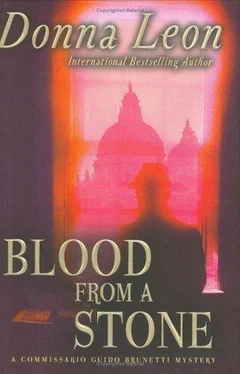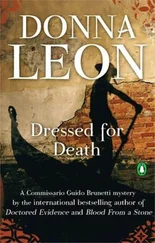Donna Leon - Blood from a stone
Здесь есть возможность читать онлайн «Donna Leon - Blood from a stone» весь текст электронной книги совершенно бесплатно (целиком полную версию без сокращений). В некоторых случаях можно слушать аудио, скачать через торрент в формате fb2 и присутствует краткое содержание. Год выпуска: 2005, Жанр: Детектив, на русском языке. Описание произведения, (предисловие) а так же отзывы посетителей доступны на портале библиотеки ЛибКат.
- Название:Blood from a stone
- Автор:
- Жанр:
- Год:2005
- ISBN:нет данных
- Рейтинг книги:4 / 5. Голосов: 1
-
Избранное:Добавить в избранное
- Отзывы:
-
Ваша оценка:
- 80
- 1
- 2
- 3
- 4
- 5
Blood from a stone: краткое содержание, описание и аннотация
Предлагаем к чтению аннотацию, описание, краткое содержание или предисловие (зависит от того, что написал сам автор книги «Blood from a stone»). Если вы не нашли необходимую информацию о книге — напишите в комментариях, мы постараемся отыскать её.
Blood from a stone — читать онлайн бесплатно полную книгу (весь текст) целиком
Ниже представлен текст книги, разбитый по страницам. Система сохранения места последней прочитанной страницы, позволяет с удобством читать онлайн бесплатно книгу «Blood from a stone», без необходимости каждый раз заново искать на чём Вы остановились. Поставьте закладку, и сможете в любой момент перейти на страницу, на которой закончили чтение.
Интервал:
Закладка:
‘We did at the beginning, but after a while it seemed a waste of time to take the photo of a man we’d arrested six or seven times and who we say hello to on the street.’ He pushed the papers closer to Brunetti and added, ‘We call them tu by now, and they address us all by name.’
Brunetti pulled the papers towards him. ‘Why do you still bother?’
‘What, to arrest them?’
Brunetti nodded.
‘Dottor Patta wants arrests, so we go and arrest them. It makes the statistics look good.’
Brunetti had suspected this would be the answer, but he asked, ‘You think it really does any good?’
‘God knows,’ Rubini said with a resigned shake of his head. ‘It keeps the Vice-Questore off our backs for a week or two, and I suppose if we were to be serious about it, arrest them and take all their bags, they’d simply decide to go somewhere else.’
‘But?’ Brunetti asked.
Rubini crossed his legs, pulled out a cigarette and lit it without bothering to ask if he could. ‘But my men always leave them a couple of bags when they confiscate them, even though they’re supposed to take them all. After all, they’ve got to eat, these guys, whether they’re African or Italian. If we take all of their bags, they’ve got nothing to sell.’
Brunetti shoved the top of a Nutella jar towards the inspector. ‘And the bags?’ he asked.
Rubini took an enormous pull at his cigarette and let the smoke filter slowly from his nose. ‘You mean the ones we leave them or the ones we take?’
‘There’s the warehouse in Mestre, isn’t there?’ Brunetti asked.
‘Two of them by now.’ Rubini leaned forward and flicked ash into the proffered ashtray. ‘It’s all in there,’ he went on, using the hand with the cigarette to point to the files. ‘So far this year we’ve confiscated something like ten thousand bags. No matter how fast we chop them up or burn them, we keep confiscating more. Soon there won’t be enough room to store them.’
‘What’ll you do?’
Rubini crushed the cigarette and said, making no attempt to disguise his exasperation, ‘If it were my decision, I’d give them back to the vu cumprà so they wouldn’t have to pay to buy new ones all over again. But then what happens to all those people who work in the factories in Puglia where they make them?’ Abruptly he got to his feet, pointed at the files and said, ‘If there’s anything else you want to know, give me a call.’ At the door, he paused and looked back at Brunetti, and raised a hand in an expression of utter hopelessness. ‘It’s all crazy, the whole thing,’ he said, and left.
7
Brunetti had not read the Iliad — his laboured high school translations could hardly be considered a reading of the text — until his third year at university; the experience had been a strange one. Though he had never read the original, it was so much a part of his world and his culture that he knew even before he read it what each book would bring. He experienced no surprise at the perfidy of Paris and the compliance of Helen, knew that bold Priam was doomed and that no bravery on the part of noble Hector could save Troy from ruin.
Rubini’s files produced much the same sense of literary déjà vu . As he read through the summary of the police’s response to the arrival of the vu cumprà in Italy, he was conscious of how familiar he was with so many elements of the plot. He knew that the original street pedlars had been Moroccans and Algerians who sold illegally the handicraft articles they brought into Italy with them. Indeed, he could remember seeing their merchandise, years before: hand-carved wooden animals, glass trading beads, ornamental knives and glitzy fake scimitars. Though the report did not explain it, he assumed that their original name had been given to this wave of French-speaking itinerant salesmen in imitation of their attempts to catch the attention of their new customers with some linguistically bastardized invitation to buy.
As the Arabs were supplanted by Africans from further south, the frequency of crimes lessened: though immigration violations and selling without a licence remained, petty theft and crimes of violence virtually disappeared from the arrest records of the men who had inherited the name of vu cumprà.
The Arabs, he knew, had passed on to more lucrative employment, many of them migrating north to countries with no choice but to accept the residence permits so easily granted by an accommodating Italian bureaucracy. The Senegalesi , with no apparent propensity to crime, had originally been viewed sympathetically by many of the residents of the city, and as Gravini’s story suggested, they had earned the regard, however gruffly stated, of at least some of the officers on the street. In the last years, however, the increasing insistence with which they confronted passers-by and their apparently ever expanding numbers had worn away much of the Venetians’ original good will.
He searched, but searched in vain, for any arrests during the last few years for crimes other than violations of visa regulations or selling without a licence. There had been one rape, six years ago, but the attacker turned out to be a Moroccan, not a Senegalese. In the only arrest involving violence, a Senegalese had chased an Albanian pickpocket halfway up Lista di Spagna before bringing him to the ground with a running tackle. The African had sat on the pickpocket’s back until the police responded to the call one of his friends made on his telefonino and arrived to make the arrest. A handwritten note in the margin explained that the Albanian had turned out to be only sixteen, and so, although he had been repeatedly arrested for the same crime, he had been released the same day after being given the usual letter ordering him to leave the country within forty-eight hours.
The last file contained a speculative report on numbers: there had been days during the previous summer when an estimated three to five hundred ambulanti had lined the streets; repeated police round-ups had caused a temporary attrition, but the number was now estimated to have crept back to close to two hundred.
When he finished the report, Brunetti glanced at his watch and reached for the phone. From memory, he dialled the number of Marco Erizzo, who answered on the second ring. ‘What now, Guido?’ he asked with a laugh.
‘I hate those phones,’ Brunetti said. ‘I can’t sneak up on anyone any more.’
‘Very James Bond, I know,’ Erizzo admitted, ‘but it lets me do a lot of filtering.’
‘But you didn’t filter me,’ Brunetti said, ‘even though you knew I’d be likely to ask a favour.’ Brunetti made no attempt at small talk about Marco’s family, nor did he expect such questions: long friendship would already have alerted Marco that Brunetti’s voice was not the one he used for a social call.
‘I’m always interested in knowing what the forces of order are up to,’ Erizzo said with mock solemnity. ‘In case I can be of service to them in any way, of course.’
‘I’m not the Finanza, Marco,’ Brunetti said.
‘No jokes about them, Guido, please,’ Erizzo said in a decidedly cooler tone. ‘And try to remember never to use their name when you’re talking to me, especially if you call me on the telefonino .’
Unwilling to address himself to Marco’s unshakeable conviction that all phone calls, to make no mention of emails and faxes, were recorded, especially by the Finance Police, Brunetti instead asked, ‘It’s not as if you ever use any other telephone, is it?’
‘Not one I answer. Tell me what it is, Guido.’
‘The vu cumprà ,’ he said.
Marco wasted no time by asking the obvious question of whether this were related to last night’s killing and said instead, ‘Never been anything like it here in the city, has there, at least not since they shot that carabiniere in, when was it, 1978?’
Читать дальшеИнтервал:
Закладка:
Похожие книги на «Blood from a stone»
Представляем Вашему вниманию похожие книги на «Blood from a stone» списком для выбора. Мы отобрали схожую по названию и смыслу литературу в надежде предоставить читателям больше вариантов отыскать новые, интересные, ещё непрочитанные произведения.
Обсуждение, отзывы о книге «Blood from a stone» и просто собственные мнения читателей. Оставьте ваши комментарии, напишите, что Вы думаете о произведении, его смысле или главных героях. Укажите что конкретно понравилось, а что нет, и почему Вы так считаете.












